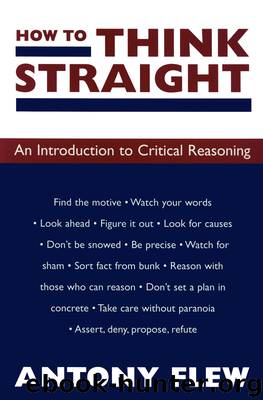How to Think Straight by Antony Flew

Author:Antony Flew
Language: eng
Format: epub
ISBN: 9781615922154
Publisher: Prometheus Books
Published: 2014-01-14T05:00:00+00:00
5.13 Vagueness, too, can be a fault. The first thing to notice about vagueness is that it ought not to be, although it often is, equated with ambiguity. To say of some word or expression or of some whole statement that it is ambiguous is to say that it can be construed in at least two different ways. (See, for instance, paragraphs 1.14–1.15 and 4.4–4.12.) Anyone who says this asks for, and should be ready to meet, the challenge: What two interpretations do you want to distinguish?
5.14 To complain of vagueness is to complain that what has been said is unacceptably indeterminate in some relevant dimension. To promise to stop by during the afternoon is to make a less precise commitment than to promise to arrive between four and six o’clock. Neither the more vague nor the more precise of these alternative promises is in any obvious way ambiguous. Equally a person may call something ambiguous without either of its alternative interpretations being such as to expose that person to the charge of imprecision. Suppose, however, that you ask me: “How did you expect them to behave?” Then your question will be importantly ambiguous. For it might reasonably be construed as an inquiry: either about what I had believed that they would in fact do; or about what I had considered that they ought to have done. Yet in neither of these different interpretations would your question have been in any obvious way vague or imprecise. Since this ambiguity of the word “expect” is one we need to keep in mind, I must follow some of my own advice (see paragraph 4.9). Let the first of the two senses just distinguished be labeled descriptive and the second prescriptive.
5.15 The second thing to notice about vagueness is that it is not a fault in a language that it provides, or provides for, some words and expressions that are more vague than others. It is reasonable to complain only when and insofar as “what has been said is unacceptably indeterminate in some relevant dimension.” Suppose that I am in no position to say more about my time of arrival than that it will be during the afternoon. Then it must be unjust to condemn me for not specifying closer limits, and it would be an awkward defect, not a merit, in my language if it rendered me unable to say the only thing I was entitled to assert. The traditional stock example of a vague term is the word “bald.” No doubt we could so redefine this word that in its future correct usage it implied some specific density of, or some specific total, hair population. But this would be a silly move. For we should be exchanging a humbly serviceable tool, which we often have occasion to employ, for a shiny new piece of futile equipment, which in our normal everyday life we never should be in a position to use correctly.
5.16 Vagueness, insofar as it is a matter of “what
Download
This site does not store any files on its server. We only index and link to content provided by other sites. Please contact the content providers to delete copyright contents if any and email us, we'll remove relevant links or contents immediately.
| Administration & Medicine Economics | Allied Health Professions |
| Basic Sciences | Dentistry |
| History | Medical Informatics |
| Medicine | Nursing |
| Pharmacology | Psychology |
| Research | Veterinary Medicine |
The Art of Thinking Clearly by Rolf Dobelli(10489)
The 5 Love Languages: The Secret to Love That Lasts by Gary Chapman(9815)
Mindhunter: Inside the FBI's Elite Serial Crime Unit by John E. Douglas & Mark Olshaker(9343)
Becoming Supernatural by Dr. Joe Dispenza(8217)
Nudge - Improving Decisions about Health, Wealth, and Happiness by Thaler Sunstein(7706)
The Road Less Traveled by M. Scott Peck(7603)
Mastermind: How to Think Like Sherlock Holmes by Maria Konnikova(7347)
Enlightenment Now: The Case for Reason, Science, Humanism, and Progress by Steven Pinker(7313)
Win Bigly by Scott Adams(7198)
The Way of Zen by Alan W. Watts(6614)
Factfulness: Ten Reasons We're Wrong About the World – and Why Things Are Better Than You Think by Hans Rosling(4742)
The State of Affairs by Esther Perel(4720)
Gerald's Game by Stephen King(4654)
Man's Search for Meaning by Viktor Frankl(4606)
The Confidence Code by Katty Kay(4260)
Thinking in Bets by Annie Duke(4227)
The Healing Self by Deepak Chopra(3578)
Hidden Persuasion: 33 psychological influence techniques in advertising by Marc Andrews & Matthijs van Leeuwen & Rick van Baaren(3565)
The Worm at the Core by Sheldon Solomon(3487)
